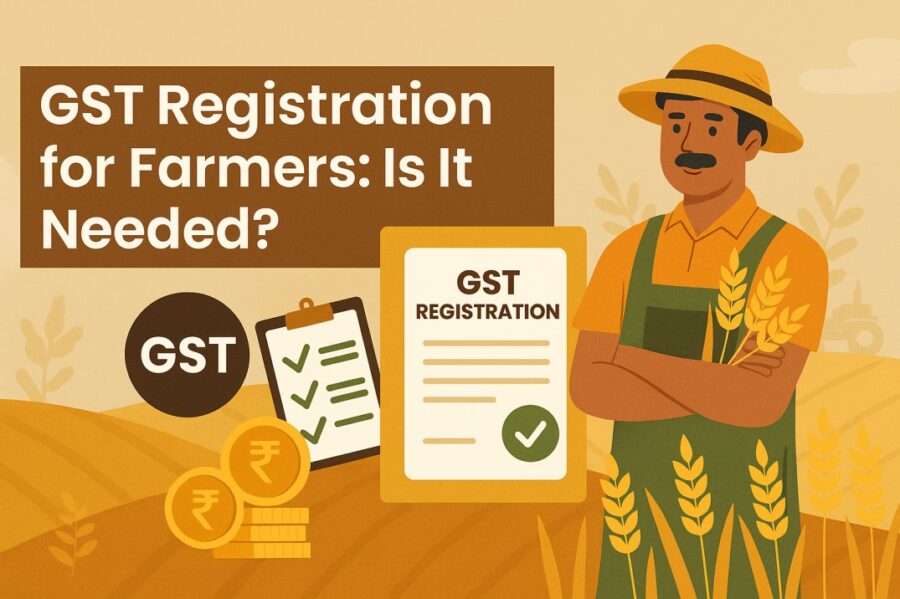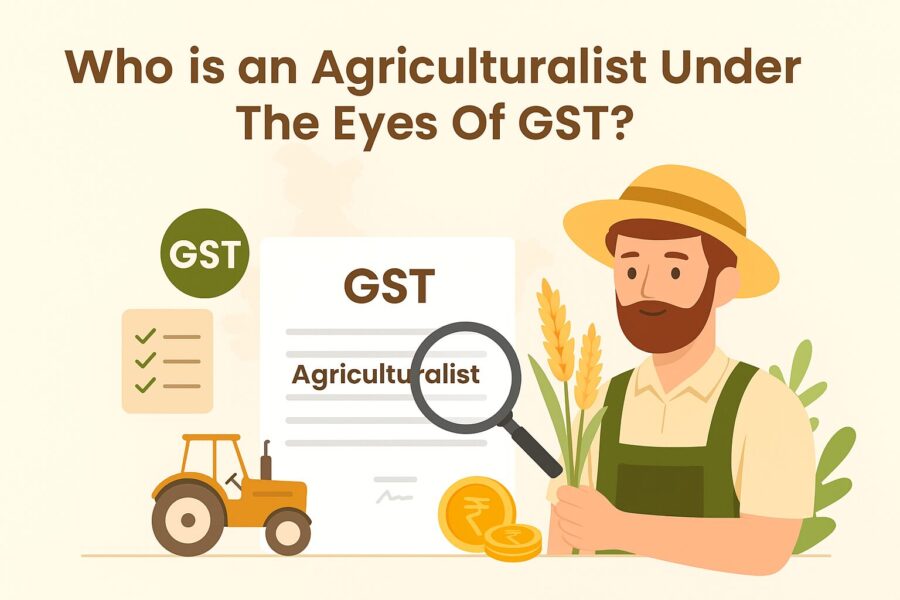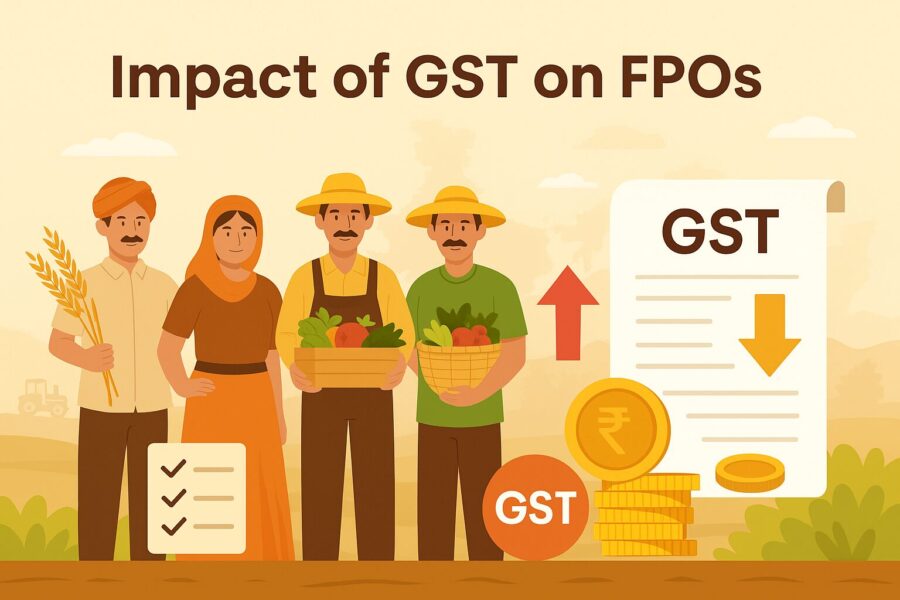GST Registration for Farmers: Is It Needed?
- 22 Sep 25
- 8 mins

GST Registration for Farmers: Is It Needed?
Key Takeaways
- Small farmers selling fresh produce like fruits, vegetables, and dairy are exempt from GST registration and tax liability.
- Large-scale farmers and FPOs exceeding turnover thresholds must complete GST registration and file returns through the GST portal.
- Commission agents and traders in agriculture are taxable under GST since commissions and inter-state supplies are treated as services.
- Voluntary GST registration helps farmers and FPOs claim Input Tax Credit (ITC) on inputs like seeds, fertilisers, and equipment.
- Farmer Producer Organisations (FPOs) registered under the FPO Act, 2022 enjoy a higher GST threshold of Rs. 1.5 crore for registration.
A significant portion of India's economy relies on agriculture, and recognising this, the finance minister has exempted many indirect taxes, such as varying GST rates for small-scale farmers. Many basic food items and agricultural products that are sold in their fresh forms, such as fresh fruits or dairy products, do not incur GST charges, as they are considered fresh products or un-processed food, essential for daily consumption.
While small farmers benefit from these exemptions, large-scale farmers and agricultural producers are required to register for the applicable Goods and Services Tax rate.
For these extensive farming operations, adhering to GST regulations and properly submitting returns through the GST portal is essential for legally conducting their business.
In this blog, we will further explore GST registration for farmers and the impacts and implications of GST liabilities and benefits on the agricultural sector, along with providing additional insightful information.
Who is an Agriculturalist Under The Eyes Of GST?

According to GST, an agriculturist is a person who is an agriculturist as an individual or from a Hindu undivided family who performs agriculture in any of these ways:
- A person who performs cultivation of land with their own labour.
- Someone whose family is in the agriculture sector and performs farming activities.
- By making servants work for wages payable in cash while you or any of your family members personally supervise their work.
The Magnitude of Taxability and Exemptions on GST for Supplies and Registration
According to the GST Act on the Indian economy, only agriculturists who have periodic produce below a selected point get an exemption from the GST rate and do not have to go through the GST registration process.
This exemption supports the overall indirect tax structure by avoiding the burden of compliance on those with minimal income from agriculture sector.
Any person who runs a company or an LLP with the sole purpose of undertaking agriculture must get a Goods and Services tax registration if the aggregate turnover exceeds the threshold. GST business registration is also applicable if that person satisfies any other GST registration criteria while selling agricultural products sourced from agricultural land through supply chains.
While Goods and Service Tax does not apply to agriculturists who directly sell their produce, here are some things you should know:
- Sale of Goods by Commission Agents: If a farmer hires an agent to sell their agricultural produce for a certain commission, then the commission earned by that agent is taxable under the GST Act.
- Inter-State Sale of Agricultural Goods: In case a commission agent makes an interstate sale of a government-specified agricultural produce, then, according to the revised GST Law, IGST will apply at a concessional rate of 2.5%.
- Registration Threshold`: The Indian Government allows agricultural producers exceeding an annual turnover threshold of Rs. 40 lakhs to proceed without mandatorily having a GST registration certificate. In some places, this threshold is Rs. 20 lakhs. However, voluntary registration allows them to avail of Input Tax Credit on various purchases made for agricultural inputs such as seeds, fertilisers, and equipment necessary for farming operations.
Here is a table that showcases the GST taxability and its rates in various scenarios of transactions of goods in the agricultural business.
| Scenario of Transaction | Applicability of GST Rates | Reason Behind the Type of Taxability |
| Farmers selling their produce directly to consumers | Not Applicable | As the agriculturist sole their own produce, no tax is applicable. |
| A farmer appoints an agent on commission to sell for them. | Taxable | The commission earned is taxable as it is a service. |
| Selling of notified agricultural produce beyond the state boundaries through supply chains. | Taxable | A concessional IGST of 2.5 % applies |
| Farmers having more produce than the threshold and opting for voluntary registration | Taxable | They do it to claim ITC on eligible purchases made for agricultural business needs. |
| Farmers having more produce than the threshold but do not have GST registration. | Not Applicable | GST registration for farmers is not mandatory. |
Impact of GST on FPOs

FPO or Farmer Producer Organisations are groups of farmers who work in unity to enhance their produce and get a better price. Here is how GST affects FPOs.
- FPOs Registered Under the Cooperatives Act or the Companies Act, 1956
According to these Acts, if an FPO acts as a commission agent for its members who help them get a better price, it has to register under GST. The Central or State government will also charge GST on its taxable agricultural products.
- FPOs Registered Under the FPO Act, 2022
FPOs who have a registry under this act enjoy a concessional threshold on GST registration of Rs. 1.5 crore. It also allows farmers to claim Input Tax Credit on various items that they purchase for the agricultural needs of their members, including agricultural inputs essential to maintain productivity on agricultural land.
Basic Requirements for a Farmer To File a GST Return
Generally, only GST-registered FPOs and commission agents file a return for GST. Here are some obligations for them while filing them.
- FPOs Registered Under the GST
- These FPOs have to file their GST return depending on their turnover and transactions. They must file these returns according to the tax laws in the Indian economy, while complying with its various obligations.
- GST Registered Traders or Commission Agents Dealing in Agriculture Products.
- Hired agents who trade farmers’ produce in return for a commission from the sales amount have to go through the GST registration process and have to duly file their returns since sales are a service and not a part of agriculture sector. These traders may deal with both fresh products and value-added goods derived from farming activities.
Conclusion
The agricultural sector in India is mostly exempt from GST rates. However, commission agents or traders must know about the various discrepancies of GST that are applicable to them. The leaders in FPOs who do not have much understanding about the obligations of GST must seek professional help to ensure their compliance with GST laws.
Make a calculative decision on registering for GST as it also offers ITC on various agricultural inputs and can also help to avail tax benefits, even if you rely primarily on agricultural income from cultivation of land.
💡If you want to streamline your payment and make GST payments via credit, debit card or UPI, consider using the PICE App. Explore the PICE App today and take your business to new heights.
 By
By 
















